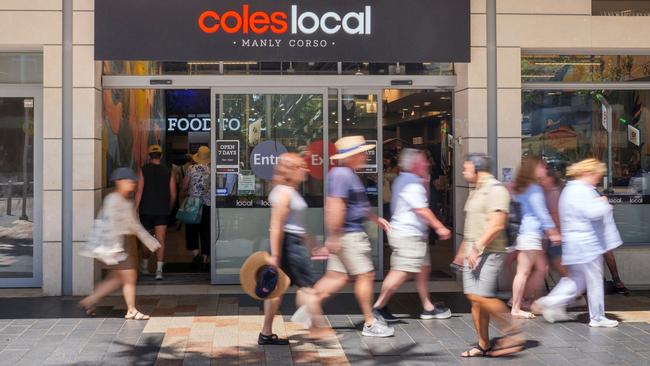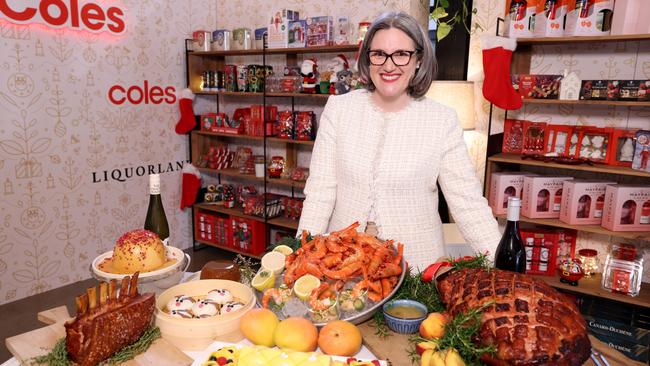Coles shoppers ditch treats, bottled water to eat more at home
The retail giant has delivered another solid quarter of sales growth but warns budget-conscious consumers are going meat free a couple of times a week and going back to tap water.

Coles says Australians are becoming more frugal and less loyal to a particular supermarket brand as they struggle to balance their budgets by trading down to cheaper groceries.
Chief executive Leah Weckert said customers were cutting back on treats, alcohol, meat and bottled water amid continuing cost of living pressures. They are also draining their loyalty points to reduce bills at the checkout.
“They may be going meat free a couple of times a week and going back to tap water instead of purchasing bottles,” said Ms Weckert. Coles on Wednesday reported sales of $10.4bn for the March quarter, up 3.4 per cent from a year earlier.
The supermarket giant navigated several severe weather events during the period, including flooding in Far North Queensland in February and the impacts of Cyclone Alfred on Southeast Queensland and Northern NSW in March.
Coles booked $9.4bn in sales from its supermarkets, a 3.7 per cent increase. Excluding tobacco, the result was an increase of 4.7 per cent. eCommerce sales rose by 25.7 per cent to $1.1bn.
Consumers are more prepared to shop at a greater variety of retailers to get the best prices, which Ms Weckert described as a significant change in consumer behaviour.
“If you go back a couple of years, customers would shop around at three or four retailers during the course of a month,” she said. “Now that number is closer to seven or eight.
“So there is an increasing propensity to drive around and use their own time to get the best prices. For less urgent items such as washing detergent and cleaning products, people are stretching out the time between purchases.”
Asked about accusations from Prime Minister Anthony Albanese of supermarket price gouging and other anti-competitive behaviour, Ms Weckert said the Australian Competition & Consumer Commission had not found any evidence of such practices.
“We should not be surprised when so many Australians are concerned with getting the budget to balance, that it is a strong conversation for us as a nation,” she said.
“But I think what was really pleasing coming out of the ACCC report is that they didn’t find any evidence of price gouging.
“In fact, they identified the biggest drivers of price increases had been fuel, energy and commodity prices.
“Actually grocery prices in Australia compared to other developed nations including the UK, Canada, EU and the US have gone up less and that talks to the degree of competition that we have here in Australia.”

Ms Weckert said customers were looking at a variety of measures to cut costs, including cashing in flybuys points to reduce their weekly shopping bill.
One promotion that resonated was for a range of Curtis Stone glass containers in a sign that people were cooking more at home and not wanting to waste food. “These Curtis Stone containers are really coming into their own because you have an effective way to cook in bulk and then store it by freezing or putting it into the fridge for a couple of days,” Ms Weckert said.
While some categories, including packaged food, were seeing price reductions, meat, fresh produce and coffee continued to rise due to weather events and production costs.
The Coles boss said there may be some light at the end of tunnel for consumers suffering from rising food prices. “If you went to the period of 2022 or 2023, there were elevated levels of inflation on supermarket prices, and they got to around 6 per cent to 7 per cent,” Ms Weckert said.
“In our result today, we are reporting pricing inflation, excluding tobacco, of only 1.1 per cent, which is significantly below the Reserve Bank target rate.”
Ms Weckert said the retailer was watching the impact of the unfolding US tariff wars on consumer behaviour. “Any direct impact on the company is likely to be minimal,” she said.
Coles has edged slightly ahead of rival Woolworths as the preferred supermarket for Australians as it ramps up pressure on its arch rival in the key battlefields of fresh food and discounting.
New shopper data from UBS released last week shows Woolworths and IGA are losing ground to Coles in terms of the number of trips to the supermarket for both dry groceries and fresh food. Coles has 34 per cent of “next 10” trips for dry groceries compared with 33 per cent for Woolworths and 28 per cent of fresh-food visits against 27 per cent for Woolworths.
The “next 10” refers to the 10 shopping trips that will occur in the immediate future, focusing on dry grocery items like canned goods, packaged snacks, and non-perishable staples.
Coles shares fell 0.8 per cent to $21.22 on Wednesday.





